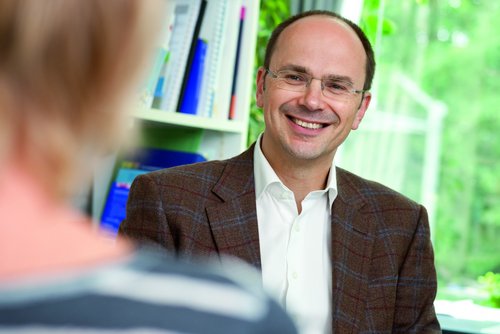Health care employees are exposed to various stresses and strains. However, most of the hospitals in Germany lack of a systematic occupational health management system. Over the next four years, the research consortium Mental Health in the Workplace Hospital (SEEGEN) under the lead of Professor Dr. Harald Gündel (Clinic of Psychosomatic Medicine and Psychotherapy) will focus on how mental health of health care employees can be strengthened as a preventive measure. The research association links sub-projects located at the University Hospitals of Ulm, Heidelberg, Düsseldorf, and Tübingen as well as the University of Düsseldorf and is funded by the German Federal Ministry of Education and Research (BMBF) with a total of 2.6 million euros.
Health as well as the development and course of diseases are determined by very different factors. Many of those factors are particularly influenced by the professional environment. On the one hand, in a positive sense, e.g., by way of experiencing recognition, being creative and productive or establishing social contacts, which can help to cope with stressful situations. On the other hand, in a negative sense, e. g., in cases where the modern, compact world of work is very demanding and, thus, creates feelings of excess strain or isolation.
Due to cost-cutting measures, working areas in hospitals and clinics have been subject to enormous changes over the last few years, especially with regard to the working conditions. This is why a systematic occupational health management is missing in this field in particular in order to influence various factors in a positive way.
The research group Mental Health in the Workplace Hospital (SEEGEN) aims to explore this challenge and to jointly develop behavioral as well as environmental preventive measures that are especially tailored to the hospital working environment. “The aim of this consortium is to analyze the structures in the hospital system in their entirety. The first project phase (funding years 1 + 2) will serve to develop specific interventions for important issues or target groups. Subsequently, the second project phase (funding years 3 + 4) will serve to carry out and evaluate combined interventions (also called complex interventions) in three clinics,” explains Prof. Dr. Harald Gündel, project manager and medical director of the Clinic of Psychosomatic Medicine and Psychotherapy. “Finally, we want to debate the results and experiences of this collaborative project also at a public-health level in order to achieve possible changes.”
The associated partners will work on different questions. In the first project phase, two sub-project partners located in Ulm (Clinic of Psychosomatic Medicine, Child and Adolescent Psychiatry) will work on improving the compatibility of work and family at a typical community hospital network (clinic group of the Ostalbkreis): “Achieving a fine balance between performing your tasks on the job and at home is often very difficult, especially when working in a hospital under the impact of shift work and work consolidation,” explains project manager Dr. Eva Rothermund, research associate at the Clinic of Psychosomatic Medicine and Psychotherapy. “Our project aims to achieve a greater compatibility of work and family by means of optimized working conditions, better coordination between hospitals and local authorities and increased self-efficacy for those affected.”
Researchers in Düsseldorf, for example, investigate how to raise the awareness among senior executives such as chief physicians and nursing division heads for occupational health management in hospitals (project management: Prof. Dr. Peter Angerer, Centre for Health and Society - Institute of Occupational and Social Medicine) and analyze economic key figures such as employer attractiveness or productivity (project management: Prof. Dr. Stefan Süß, Chair of Business Administration). Under the management of Dr. Florian Junne (Department of Psychosomatic Medicine and Psychotherapy) researchers from Tübingen are also working within a sub-project on strengthening leadership skills.
Two sub-projects are located in Heidelberg. In the first place, their aim is to develop a dilemma training for managers in order to help them by finding their way out of dilemmas (project management: Prof. Jochen Schweitzer-Rothers, Department of Division of Medical Organizational Psychology). In the second place, they aim at promoting a healthy, successful aging in the nursing sector (project management: Dr. Imad Maatouk, Department of General Internal and Psychosomatic Medicine).
The second project phase (funding years 3 and 4) will serve to implement the individual intervention modules in combination (also called complex intervention) at three clinics and evaluate them on the basis of health- and business-related parameters in a cluster randomized procedure. The qualitative evaluation in this phase will be carried out by the head of the Section Process-Outcome Research, PD Dr. Bernd Puschner.
The medium-term objective of the consortium project is to improve the quality of work in hospitals, combat staff shortages and improve treatment quality.
Please find the German version of this press release here.
